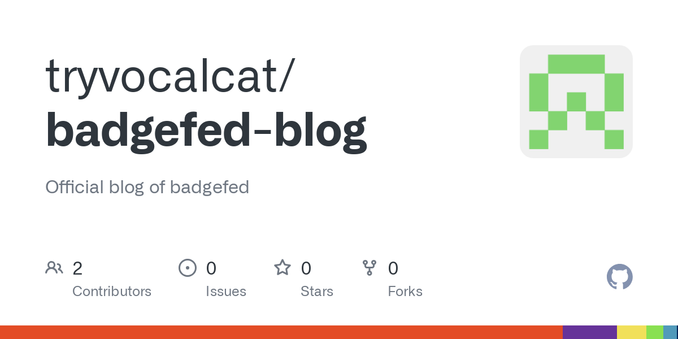Recent searches
Search options
#hugo
And in my next act I will deploy the blog for #badgefed to #cloudfare and make it static with #hugo and still #federate with #activitypub using workers

Periodic update:
- graduated from my studio engineering program
- minor medical things
- more background on the song we released CC-BY-SA this week
I'm looking for a new comment system for my #Hugo blog, and I'm not seeing any clearly great options.
I've been using #Commento for #comments on my blog for a few years now, and it's about time to switch comment systems.
Commento has been effectively unmaintained for 4 years (see https://gitlab.com/commento/commento). Their (paid) hosted version has been continuing to work, but I've seen increasing numbers of errors lately, so it's time to move.
I'd really *love* something that could integrate semi-natively with #activitypub so new blog posts could show up in Mastodon and Mastodon replies would show up as comments, *but* I don't want to require a fediverse account for commenters; that rules out most (all?) of the embedded-Mastodon comment options.. After looking through Hugo's somewhat-outdated list of commenting options (https://gohugo.io/content-management/comments/), it looks like #Discourse is the only option that even *slightly* fits that, and it's a lot heavier-weight than I really want to run today. Hours-of-maintenance-per-comment should be less than 1, thanks.
Basic requirements:
- Either easy to self-host or has a cheap hosted option.
- Allows anonymous comments plus common external auth options.
- Possible to import comments from Commento, possibly requiring code on my part, but it needs to allow arbitrary names, etc.
- Works with static sites.
- Not a privacy disaster
- If self-hosted, ideally written in something sane -- Go, Rust, etc. *Ideally* it's a single binary that listens to HTTP and stores comments in Postgres.
- Supports Markdown.
Does anyone have anything that they're really happy with?

I’m a wordy bastard. I really struggle with 500 characters. I’d struggle with 500 words sometimes. It's been hard to find a flow here (despite Mona's fantastic thread generator.)
I’m creating a #blog to house longer writings and share thoughts here without requiring anyone to visit platforms so many gathered here to avoid.
I'm using #Hugo instead of my usual #WordPress and dipping my toes into #Go and #TailwindCSS. I've only created the local structures, but so far, I dig it! It's #FOSS too!
Like many others, I post notes about my reading in my blog. Some of those notes are rather long, and some readers might stop scrolling and leave the page before noticing a book that they might find interesting. But TIL about the HTML details disclosure element. Now I have a short summary, and readers can click on the summary to reveal the entire note. Seems much cleaner to me. (And #emacs, #oxhugo, and #hugo make it very easy to do this.)
This was also an opportunity to test Obsidian's new Web Viewer plugin. It is so much of a smoother experience, being able to edit your text and see the effect right away. If you use something like Hugo's dev server locally, it will cause the page to re-render each time the file gets saved, so changes are near-instantaneous.
Great stuff!
A couple of years back I wrote a blog post about linking my static blog posts to Mastodon threads so that the threads can serve as blog comments.
I realise I never pinned that post to my profile, and I have since deleted the Mastodon thread, so I'm sharing it again. I'm pinning it this time!
Hey @NVAccess someone wanted me to record going through their #Hugo and #Eleventy website, on video, using a screen reader and upload the video to PeerTube. Is there any visual things I can do to make the experience easier to follow for sighted viewers? I've enabled speech viewer but I can't seem to alt tab to it? Am I supposed to dock the speech viewer on the side of the screen or keep it focused? I have the highlight enabled. Is there anything else I can do to make the keystrokes easier to follow visually built into NVDA itself?
I've been putting together a website for my partner's research group (as one does). I went with #hugo because that's what I use in my personal site but this time I found a lot more friction. Granted, it was a more complex setup (multilingual + Decap CMS + existing template) but man, Hugo can be cryptic with its error messages. And you better pin a specific version as it tends to break things between upgrades.
What do people use for static sites nowadays?
well that's cool...
TIL about https://github.com/ggreer/the_silver_searcher #silversearcher #ag feature `filetypes`:
```shell
~/repos/hugo/blogsite/content $ zed $(ag --markdown -l '^kind: ')
```
Used it to easily find all the files which cause #hugo's deprecation of setting `kind:` in markdown frontmatter in 0.144.0 to growl.
yay toil reduction..
it'll be nice when hugo reaches 1.0 tho and can finally start barking more loudly on breaking changes
I've been playing around with #duckdb and this fits perfectly.
Hence I'm now working on porting this over to #duckdb as a result.
I'm trying to do all of this in #sql as much as I can to minimise any post-processing.
I've also decided to switch the current page to a #hugo rendered page as wel. I think #hugo has matured to the point where it supports this use case.
At the moment this effort is solo (myself). If anyone wishes to help, please get in touch..l I don't bite! :)
#Hugo, why is there no option to perform a full rebuild of the entire site if some file changed (when watching for changes)?
If I change the title of one page, none of the other pages is rebuilt, and menu entries get out-of-date very fast.
I've written about how we've migrated the @OpenBio website from Wordpress to Hugo. Which was surprisingly easy, especially given that the OBF website has been around since _2001_, so there's nearly 25 years worth of blog posts, conference pages etc.
Found a solution.
Create a user unit file in /etc/systemd/user, which can be enabled for loginctl linger-users, which just continuously watches on the Hugo content path …
i.e.
> systemctl enable --user --now hugo@$(systemd-escape $HOME/wwwroot/domain)
Continuous Build made easy.
One can do so much with Hugo on websites, at this point I'm addicted to playing with it.
Can someone point me to an explainer on what is happening in the #Hugo SSG (Static Site Generator) community? I hear stuff about "pay for features" but 'm not really sure what is happening. (FTR, I still happily rely on #Jekyll for my sites, but am always willing to try alternatives and Hugo was obviously a possible choice)
Please stop me from writing a #Hugo frontend in #AspDotNet.
Actually writing a blog post again after years and realizing that my #hugo theme is, of course, kind of out of date with various deprecation warnings and errors. While #blogdown thankfully introduced a mechanism to cache a specific hugo version to ensure reproducibility, I can technically still work on blog posts, preview the site, and render without issues on Netlify as I've always done.








